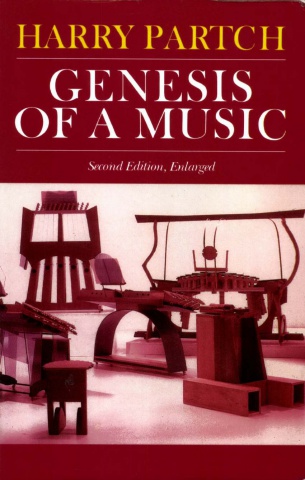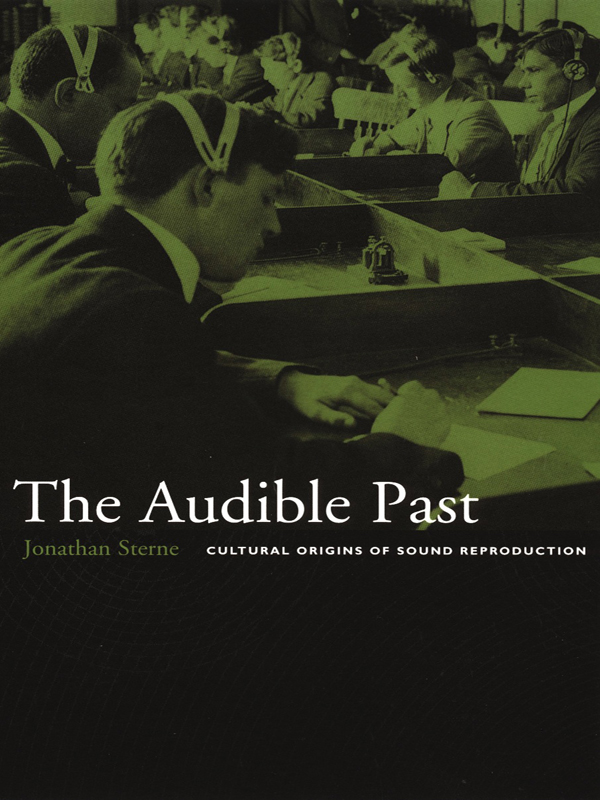Harry Partch: Genesis of a Music, 2nd ed. (1949/1974)
Filed under book | Tags: · acoustics, composition, music, music history, music theory

Having lived mostly in the remote deserts of Arizona and New Mexico with no access to formal training, the microtonal composer Harry Partch (1901-74) created theatrical ritualistic works incorporating Indian chants, Japanese kabuki and Noh, Polynesian microtones, Balinese gamelan, Greek tragedy, dance, mime, and sardonic commentary on Hollywood and commercial pop music of modern civilization. First published in 1949, Genesis of a Music is the manifesto of Partch’s radical compositional practice and instruments. He contrasts Abstract and Corporeal music, proclaiming the latter as the vital, emotionally tactile form derived from the spoken word (like Greek, Chinese, Arabic, and Indian musics) and surveys the history of world music at length from this perspective. Parts II, III, and IV explain Partch’s theories of scales, intonation, and instrument construction with copious acoustical and mathematical documentation.
First published in 1949
Publisher Da Capo Press, 1974
ISBN 030680106X
517 pages
via GpscftObti
PDF (no OCR, 80 MB)
Comment (0)Jonathan Sterne: The Audible Past: Cultural Origins of Sound Reproduction (2003)
Filed under book | Tags: · history of technology, listening, media technology, music, music history, phonograph, radio, sound, sound recording, technology, telegraphy, telephone

“The Audible Past explores the cultural origins of sound reproduction. It describes a distinctive sound culture that gave birth to the sound recording and the transmission devices so ubiquitous in modern life. With an ear for the unexpected, scholar and musician Jonathan Sterne uses the technological and cultural precursors of telephony, phonography, and radio as an entry point into a history of sound in its own right. Sterne studies the constantly shifting boundary between phenomena organized as “sound” and “not sound.” In The Audible Past, this history crisscrosses the liminal regions between bodies and machines, originals and copies, nature and culture, and life and death.
Blending cultural studies and the history of communication technology, Sterne follows modern sound technologies back through a historical labyrinth. Along the way, he encounters capitalists and inventors, musicians and philosophers, embalmers and grave robbers, doctors and patients, deaf children and their teachers, professionals and hobbyists, folklorists and tribal singers. The Audible Past tracks the connections between the history of sound and the defining features of modernity: from developments in medicine, physics, and philosophy to the tumultuous shifts of industrial capitalism, colonialism, urbanization, modern technology, and the rise of a new middle class.
A provocative history of sound, The Audible Past challenges theoretical commonplaces such as the philosophical privilege of the speaking subject, the visual bias in theories of modernity, and static descriptions of nature. It will interest those in cultural studies, media and communication studies, the new musicology, and the history of technology.”
Publisher Duke University Press, 2003
ISBN 082233013X, 9780822330134
450 pages
via nutzenberg
Reviews: James P. Kraft (American Historical Review), Karin Bijsterveld (Technology and Culture).
PDF (updated on 2022-12-7)
Comment (0)Benjamin Piekut: Experimentalism Otherwise: The New York Avant-Garde and Its Limits (2011)
Filed under book | Tags: · avant-garde, experimental music, jazz, music, music history, new york, performance

“In Experimental Otherwise, Benjamin Piekut takes the reader into the heart of what we mean by “experimental” in avant-garde music. Focusing on one place and time–New York City, 1964–Piekut examines five disparate events: the New York Philharmonic’s disastrous performance of John Cage’s Atlas Eclipticalis; Henry Flynt’s demonstrations against the downtown avant-garde; Charlotte Moorman’s Avant Garde Festival; the founding of the Jazz Composers Guild; and the emergence of Iggy Pop. Drawing together a colorful array of personalities, Piekut argues that each of these examples points to a failure and marks a limit or boundary of canonical experimentalism. What emerges from these marginal moments is an accurate picture of the avant-garde, not as a style or genre, but as a network defined by disagreements, struggles, and exclusions.”
Publisher University of California Press, 2011
ISBN 0520948424, 9780520948426
296 pages
Reviews: Thomas Fogg (Current Musicology, 2011), Clemens Gresser (Notes, 2012), Molly McGlone (Twentieth-Century Music, 2013), Jeremy Grimshaw (American Music, 2014).
PDF (updated on 2020-5-3)
Comment (0)
